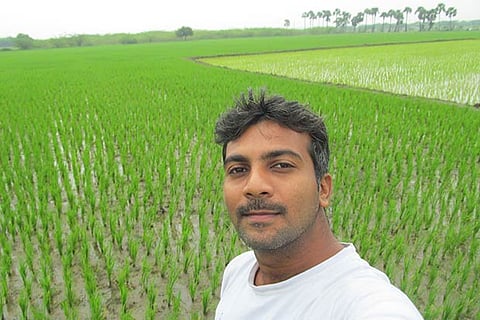

Chennai
Good grades in school, an engineering degree and later an MBA, before finally landing a six-figure-paying corporate job, Chennai-born Vinoth Kumar had what seemed to be a perfect life. But after the first four years of being employed, things did not look so rosy to him. “My life had become very monotonous. I was just repeating the same tasks over and over again and again, seeing the same things day after day, there was nothing new or exciting or enjoyable. I began to wonder if this was what I wanted to be doing for the rest of my life,” he recounts.
To escape from the humdrum routine, in 2011, Vinoth decided to take a break and travel across the country. This lasted over a year and three months, a period that opened doors that he had never imagined. “On one hand, I was shocked to see what rapid urbanisation had reduced our farmlands to. On the other, there was the sad reality of the dwindling farming community that didn’t want future generations to take up the profession because of earning hardly enough to make ends meet.”
He was distressed that farmers today felt that they occupied the lowest rung in the social hierarchy and wanted to do something to bring back the glory and selfrespect of the farming community. He came back to Chennai, and told his parents that he wanted to leave his corporate cubicle forever and take up farming as a full-time profession. This was in early 2014.
Back to his roots: Farming, however, wasn’t alien to him, for he was going back to his roots. “I come from an agricultural family. My grandfather was a farmer for more than six decades in our hometown Cheyyur,” says Vinoth who farms in this charming village about 95 km south of Chennai. “Although my father worked as a principal in a Chennai school, despite relocating, he was a part-time farmer and the village was always a crucial part of our growing-up years,” he says. Vinoth now grows millets, pulses and oilseeds in his fields, that he chose as they consume less water.
Knowledge sharing: Apart from tending to his own fields, Vinoth promotes organic farming in his village, sharing the skills he imbibed from his father and grandfather, and also the knowledge he acquired during his extensive travels and through training programmes. Vinoth, however, understands that for farmers to make the transition from chemical farming to organic farming isn’t going to be easy. He acknowledges, “Most farmers have been forced to take to chemical farming because of the increased demand for more produce, something that will take a hit if they shift to organic farming overnight.”
He has come up with an interesting idea to tackle this. He asks farmers to use organic fertilisers in place of chemical fertilisers in the first season of cultivation. Then, in the second, he asks them to reduce the amount of chemical fertilisers used. “This leads to a slow, yet smooth, transition. In the case of organic farming, even if the produce reduces in the initial stages, farmers can cut down on other expenses. They do their own seed selection and make their own fertilisers, thus obtaining an overall profit in the end.” As chemical farming leads to a host of health issues, he also ensures that farmers maintain proper health records, accounting for the amount of money spent on hospital bills, medicines, etc. so that they get a complete picture of the advantages of organic farming. He also guides them with the latest government schemes, insurance options and navigating the involved procedures.
Documentation of traditional farming methods: Vinoth, who has met farming communities in Tamil Nadu that have been in the field well before the use of chemicals, says, “They have so much knowledge about organic farming. But what has prevented them from passing on this knowledge to the younger generation is lack of documentation. When I interacted with elderly farmers, I got so much information that I thought when just one Indian state could unravel so many ideas, the rest of the country must have a lot more.”
He is thus all set for his next mission - he will embark on a cycling journey on April 14 from Kanyakumari, covering the length and breadth of the country to catalogue traditional farming methods and create awareness on sustainable living. It is not just farming communities in India we can learn from, says Vinoth adding, “Countries like Vietnam where some 55 percent of the labour force is involved in agriculture, traditional and innovative farming methods dominate.” After his Indian research trip, he plans to travel to about 11 countries — Sri Lanka, Indonesia, Singapore, Malaysia, Thailand, Laos, Cambodia, Vietnam, Myanmar, Bangladesh and Bhutan – to document this information.
Vinoth’s belief is impassioned because he has seen it all up close. “It is not medical insurance or big hospitals that promote health, but rather investing in healthy food that will save lives. And for this to happen, we should respect farming as an honourable profession, and make policies that work for, not against, farmers who want to grow healthy food. Organic and truly sustainable farming is the answer to many of the world’s problems and should become the only type of farming practiced if we want to heal the world,” he concludes.
Visit news.dtnext.in to explore our interactive epaper!
Download the DT Next app for more exciting features!
Click here for iOS
Click here for Android